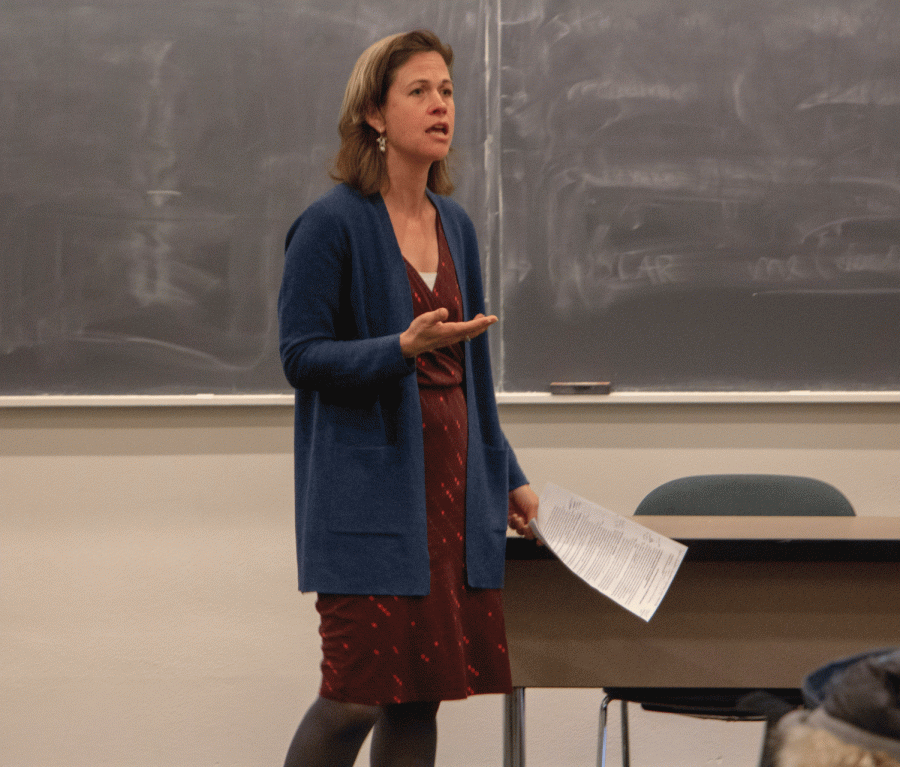The Philosophy of Sarcasm, Jokes and Deniability
An Associate Professor of Philosophy at Rutgers University, Elisabeth Camp, explored the philosophy of rhetorical success.
Much of what we say is not actually said at all. We communicate through the quirk of an eyebrow, the pursing of lips, the folding of arms or tone of voice. It is one of the marvels of human communication—the ability to speak volumes without speaking a word. Elisabeth Camp, Associate Professor of Philosophy from Rutgers University, provided her expertise on this subject to a crowd of students and faculty on April 11 at 4:15 during the Philosophy Colloquium titled “Just Kidding: Sarcasm, Jokes, and Willful Deniability in Speech.”
Camp is one of the leading scholars in developing ways of thought that go beyond the black-and-white perspective of true and false, instead focusing on the murky gray area in between. In this specific lecture, she outlined familiar linguistic phenomena designed to skirt accountability and express unspoken meaning.
“The great power of human communication—linguistic communication—comes not from the complexity of our language, but from the ways we can harness unstated assumptions to coordinate in unstated ways,” Camp said.
Camp first outlined communication tactics that provide an innocent, literal meaning but a harsher, unspoken meaning. Some of these included insinuation, sarcasm and jokes. She even provided a meticulously organized handout with examples of these linguistic slights of hand, which ranged from one-on-one conversations about household chores to speech in the public sphere with examples from major figures such as President Trump and Speaker of the House Nancy Pelosi. One such example Camp used was of Pelosi’s clap after the 2019 State of the Union Address that went viral for its sarcastic delivery. It was clear from her body language that the clap was sarcastic, but she was able to argue that she was applauding the president and could not be faulted for that.
Camp’s second portion of the talk focused on the concept of plausible deniability, which is the ability of a speaker to deny their unspoken meaning. The main way people use this linguistic escape door is to keep their true meaning on the peripheral of the conversation instead of making it the main topic. This way, the speaker can escape a direct response and there is no evidence of their true intentions. Camp described denial as bridging the gap between what is mutually obvious and what the speaker is willing to acknowledge as mutually obvious. These conversations function as an invitation to intimacy composed of shared, implicit assumptions.
Camp concluded her talk with advice on how to combat these linguistic tricks to make people take accountability for what they mean. She warned that directly asking about one’s unstated meaning can backfire, since doing so would provide validity to the speaker’s point and would make the hearer complicit in their presuppositions. Instead, Camp suggests using pedantry as the weapon with which to cut down the speaker’s attempt to avoid accountability. For example, the hearer could feign incomprehension to force the speaker to explain themselves or twist the intended connection to the hearer’s benefit. These methods could be employed in everyday conversations, and Camp used her own experience as an example with an anecdote about a squabble with her husband over running the dishwasher.
She left the audience with the caveat that rhetorical success in these situations is the result of a multitude of factors.
“Success can depend at least as much on wit and on being fast on your feet, being imaginative and coming up with an effective response, and on the sociopolitical dynamics,” Camp said.
Camp’s lecture brought attention to the linguistic tools we are all guilty of using in order to avoid accountability for the risky, hidden meaning of our words. Her examples made us realize just how often we unintentionally use sarcasm or jokes to deflect responsibility for our words. Her lecture cultivated a greater awareness of the rhetorical decisions we make in everyday discourse, which in turn helps the audience safeguard against becoming a powerless listener in conversations with hidden meaning.
Contact Rose Corcoran at [email protected].







